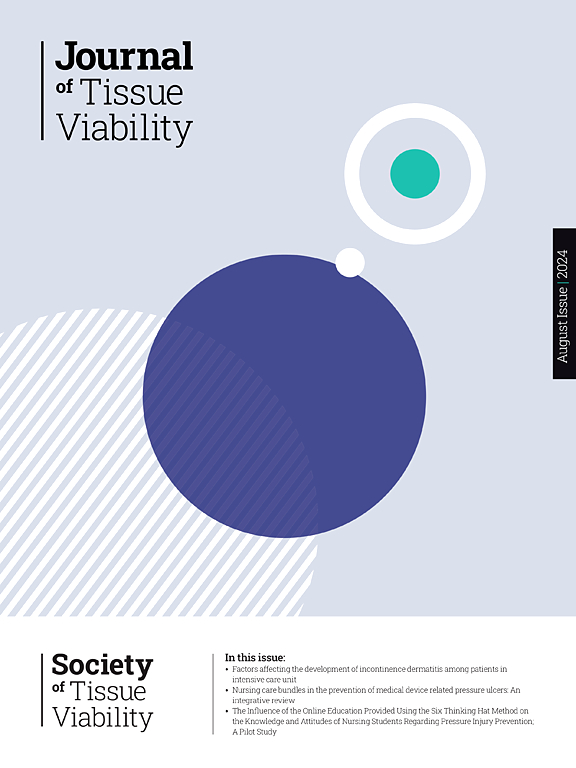The effect of itching on sleep quality and comfort in patients with hemodialysis and renal transplantation: A multi-center cross-sectional study
IF 2.4
3区 医学
Q2 DERMATOLOGY
引用次数: 0
Abstract
Background
The aim of this study was to determine the effect of itching on sleep quality and comfort in hemodialysis (HD) and renal transplant (Tx) patients with itching.
Methods
This descriptive, correlational seeking and cross-sectional study was conducted in four hospitals affiliated with a private health group in Istanbul between April and June 2021. The sample of the study consisted of 42 patients receiving HD treatment and 49 patients with renal transplantation. Data were collected using the Patient Information Form, 5-D Itch Scale, Richards-Campbell Sleep Questionnaire and General Comfort Questionnaire.
Results
There was a significant difference between the HD and renal transplantation groups in the Direction (p = 0.01) and Disability dimension (p = 0.002) of the 5- D Itch scale in favor of the renal transplant group. The mean sleep quality and comfort scores of the groups were similar and moderate. Itching negatively affects sleep quality in patients receiving HD treatment, and 22 % of the change in sleep quality is explained by disability of itching (R2 = 0.22; p = 0.002). Itching negatively affects comfort in both groups. Itching explains 27 % of the change in comfort level in the HD group (R2 = 0.27; p = 0.002) and 25 % of the change in comfort level in the renal transplantation group (R2 = 0.25; p = 0.001).
Conclusions
According the study results during the hemodialysis treatment process, itching is more intense in terms of distribution and disability and affects the quality of sleep of patients. Itching has a significant impact on patients' perception of comfort. Patients experience itching both during HD treatment and after renal transplantation, which significantly impairs their comfort. Therefore, itching should be carefully monitored during renal replacement therapy and its effects on patients should be evaluated.
瘙痒对血液透析和肾移植患者睡眠质量和舒适度的影响:一项多中心横断面研究。
背景:本研究旨在确定瘙痒对血液透析(HD)和肾移植(Tx)患者睡眠质量和舒适度的影响:本研究旨在确定瘙痒对血液透析(HD)和肾移植(Tx)患者睡眠质量和舒适度的影响:这项描述性、相关性和横断面研究于 2021 年 4 月至 6 月期间在伊斯坦布尔一家私营医疗集团下属的四家医院进行。研究样本包括 42 名接受 HD 治疗的患者和 49 名肾移植患者。数据收集采用了患者信息表、5-D瘙痒量表、理查兹-坎贝尔睡眠问卷和一般舒适度问卷:结果:血液透析组和肾移植组在5-D瘙痒量表的方向(p = 0.01)和残疾(p = 0.002)维度上有明显差异,肾移植组更胜一筹。两组患者的平均睡眠质量和舒适度评分相似,均为中等。瘙痒对接受 HD 治疗的患者的睡眠质量有负面影响,22% 的睡眠质量变化可以用瘙痒残疾来解释(R2 = 0.22;p = 0.002)。瘙痒对两组患者的舒适度都有负面影响。在血液透析组中,瘙痒可解释27%的舒适度变化(R2 = 0.27;p = 0.002),在肾移植组中,瘙痒可解释25%的舒适度变化(R2 = 0.25;p = 0.001):根据研究结果,在血液透析治疗过程中,瘙痒在分布和致残方面更为剧烈,并影响患者的睡眠质量。瘙痒对患者的舒适感有很大影响。无论是在血液透析治疗过程中还是在肾移植术后,患者都会感到瘙痒,这严重影响了患者的舒适度。因此,在肾脏替代疗法期间应仔细监测瘙痒情况,并评估其对患者的影响。
本文章由计算机程序翻译,如有差异,请以英文原文为准。
求助全文
约1分钟内获得全文
求助全文
来源期刊

Journal of tissue viability
DERMATOLOGY-NURSING
CiteScore
3.80
自引率
16.00%
发文量
110
审稿时长
>12 weeks
期刊介绍:
The Journal of Tissue Viability is the official publication of the Tissue Viability Society and is a quarterly journal concerned with all aspects of the occurrence and treatment of wounds, ulcers and pressure sores including patient care, pain, nutrition, wound healing, research, prevention, mobility, social problems and management.
The Journal particularly encourages papers covering skin and skin wounds but will consider articles that discuss injury in any tissue. Articles that stress the multi-professional nature of tissue viability are especially welcome. We seek to encourage new authors as well as well-established contributors to the field - one aim of the journal is to enable all participants in tissue viability to share information with colleagues.
 求助内容:
求助内容: 应助结果提醒方式:
应助结果提醒方式:


